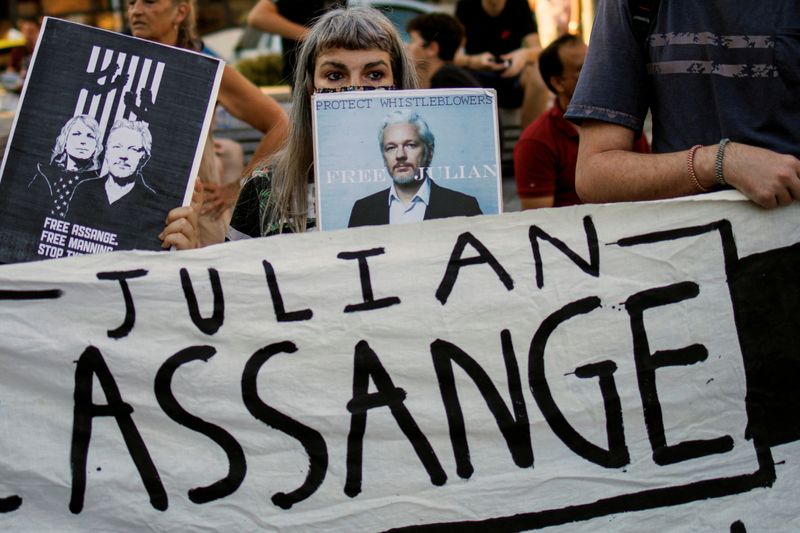Australian lawmakers call for release of Julian Assange during talks in Washington
2023.09.20 19:08

© Reuters. FILE PHOTO: A supporter holds a poster depicting Julian Assange during a protest against the extradition of WikiLeaks’ founder from Britain to the U.S., in Athens, Greece, June 20, 2022. REUTERS/Alkis Konstantinidis/File Photo
By Kanishka Singh and Renju Jose
WASHINGTON/SYDNEY (Reuters) – A cross-party delegation of Australian lawmakers that traveled to the United States seeking the release of WikiLeaks founder Julian Assange said they had a productive discussion in Washington with the U.S. Justice Department.
The group of Australian lawmakers urged U.S. officials to drop their attempts to extradite Assange from a British prison to the United States, where he is wanted on charges over WikiLeaks’ release of confidential U.S. military records and diplomatic cables.
“We had a fair hearing and we had a productive discussion,” Australian Senator Peter Whish-Wilson said after the meeting.
The delegation included lawmakers from the Labor government, the opposition Liberal and National parties, and the Greens.
Labor Member of Parliament Tony Zappia said Australians believed Assange, an Australian citizen, had been punished enough and that his charges should be dropped.
“Our discussions with the Department of Justice right now and with others in Washington have enabled us to put that view very clearly and very strongly, we’ve done that,” Zappia told reporters.
If the matter is not resolved, it will be damaging for bilateral relations between Australia and the United States, Australian Greens Senator David Shoebridge told reporters.
A handful of Assange supporters gathered outside the Justice Department building where the meeting took place and hailed Assange as a journalist who should be reunited with his family.
Assange’s supporters say he has been victimized because he exposed U.S. wrongdoing and potential crimes, including in conflicts in Afghanistan and Iraq. Washington says the release of the secret documents put lives in danger.
Australian Prime Minister Anthony Albanese in May said he was frustrated that a diplomatic solution had not been reached to end Assange’s detention, and that he remained concerned about Assange’s mental health. Zappia said Albanese might raise the issue when he visits the U.S. next month.
Support for Assange among U.S. policymakers remains low.
If extradited, Assange faces a sentence of up to 175 years in a maximum-security prison.








